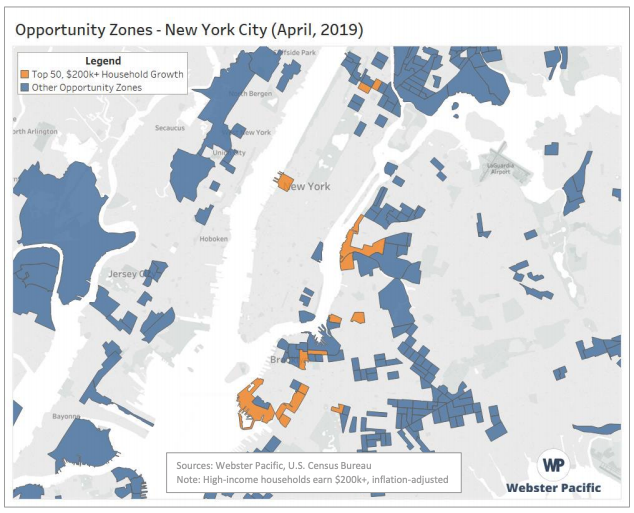New York City ranked as the top high-growth Opportunity Zone area, highlighting the disconnect between the federal tax program’s goal of encouraging investment in economically distressed areas across the country and its designation of zones in areas that are already developed.
Opportunity Zone designations are based on census tracts, which are generally required to meet a low-income threshold or be next to another tract that qualifies, which has allowed certain high-income areas to be chained together with nearby low-income tracts.
The gap is most pronounced in the New York metropolitan area, according to a new report from San Francisco-based consulting firm Webster Pacific. The study ranked census tracts by the percentage change in $200,000-plus-income households since the turn of the century. The No. 1 tract, located in Gowanus, reported almost no households earning $200,000 or more in 2000, but such households now account for 22 percent of its population.
“The single leading metropolitan area is New York City, which contains nearly four times as many high-growth tracts as the next highest area, the San Francisco Bay Area,” the report states. “Some of the top 50 Opportunity Zones were already wealthy and got much wealthier; the most extreme examples include tracts in New York, Houston, San Juan (P.R.), and Silicon Valley.”
Fifteen census tracts in New York City were found to be “high-growth” in the report. San Francisco had only four such tracts, according to Bloomberg.
Critics of the program, which was passed as part of the 2017 tax overhaul, argue that the legislation may serve to enhance gains on projects that developers already intended to build, instead of lifting up distressed neighborhoods.

(Source: full Webster Pacific report)
In Chicago, two census tracts covering a $2B redevelopment site were designated as Opportunity Zones, despite being left out in an earlier analysis that said they did not meet the city’s guidelines for neighborhoods in need of more investment, a recent investigation by The Real Deal found. [Bloomberg] — Kevin Sun
